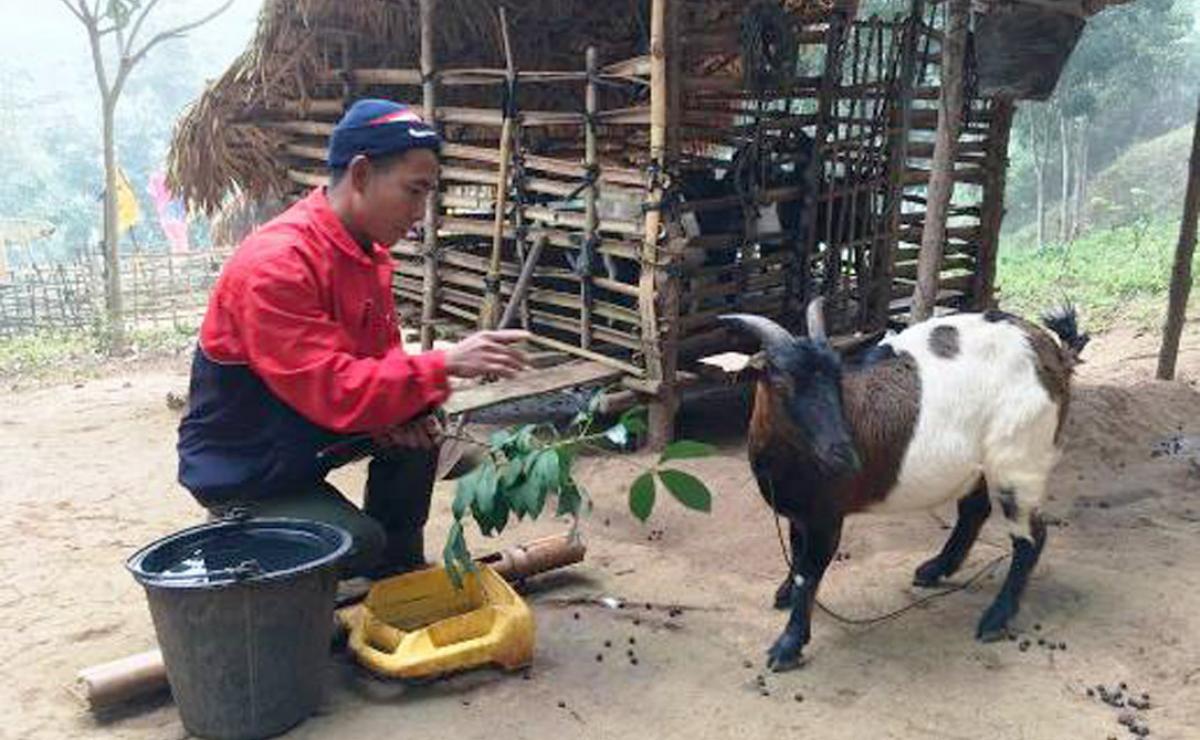New farming techniques improve income for remote Laotian communities

LWF project enables people to take control of their future
(LWI) – Harvest is a time of happiness for Perng Si, a farmer in Kampone village, Vieng Phoukha district, Laos. In addition to having enough to feed his family, Perng Si earned more than 20,000 kip (3 USD), from selling surplus vegetables and fruit to his neighbors. In a country where many people live on less than a dollar a day, that is a good start.
“Previously, my family and I would collect vegetables from the forest,” he says. “Because the entire community was looking for plants and fruit to eat, there was never enough for all of us. Now we have a wider variety and also vegetables from our own planting.”
His neighbors are customers, the farmer says. ‘‘Most of the vegetables harvested in the community are for family consumption, the children also like to eat vegetables.”
Improving the infrastructure
Perng Si and the people in his village are supported by the Rights-Based Empowerment Project run by The Lutheran World Federation which has been ongoing since 2012. Rights-based empowerment means enabling people to take control of their own future, rather than offer them charity.
In close partnership with the local authorities, the project supports rural communities to develop sustainable livelihoods through various activities including agriculture, improved healthcare, sanitation and better education infrastructure, as well as the formation of community-based organizations.
In Kampone, LWF staff conducted training on making natural fertilizer. Trainers encouraged people to use natural sources instead of the expensive chemical fertilizer, which was also bad for the farmers’ health.
In training sessions on vegetable farming and animal husbandry, the people who live from daily labor were supported in organizing themselves to find more long-term livelihood solutions.
The project is implemented in remote and vulnerable communities of the Luang Namtha province, which sits in the very north of the country, bordering Myanmar. While the area is known for lignite mining and large rubber plantations, most of the population still lives on small scale farming.
In partnership with rural communities, the LWF helps them realize their full potential to develop in sustainable ways. Many communities rely on upland farming for income and collect wild vegetables to sell locally.
Support local ideas
‘‘This is what I’ve wanted to do for very long but I didn’t have anyone to help,” says Perng Aiy, a single mother caring for a 13-year-old son with a disability. She took part in animal husbandry training in 2014 and received a pair of goats to start the so-called village revolving fund.
The goats have reproduced. Perng Aiy has now four kids of her own and will in turn give a pair of goats to someone else in the village. She has vaccinated the animals as instructed in the training session and hopes to have more healthy animals to sell for more income soon.
While an initial startup of farm animals and tools is a visible gain, the training mostly focuses on sustainable solutions: how to always have a good harvest and healthy livestock.
A villager, Mr Bounla, who also received training is an example of the success of that training. “I will put the goats out to graze later in the day when the grass is dry, because the dewy grass will poison them,” he says, following the advice of the trainer. His pair of goats has already produced six young ones. Bounla sold one for the equivalent of 60 USD to pay school fees for his two young daughters.
While the delicate plants of development are taking root in Kampong and the other villages however, large-scale development plans in the regions threaten their growth.
Government policy encourages investment by large companies, which use chemicals to fertilise large fields of bananas and watermelon, affecting the environment and the sustainable methods of farming used here. Climate change has also made itself felt in recent years, the winters are colder and the young animals die in the unfamiliar cold.
LWF supports the local communities with techniques for dealing with natural disaster and long-term adaptation to climate change.
Contribution by Alounsavath Thongphanith, LWF Laos. Edited by LWF Communications.

